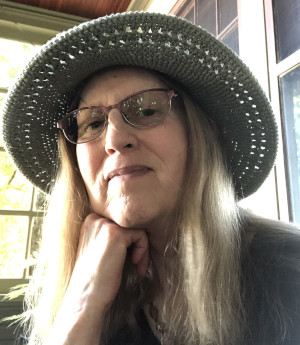Bio

OLIVIA WHITAKER DRESHER is a writer, publisher and editor, anthologist, former musician, and an advocate for historic preservation. She was born in Washington D.C. on May 13, 1945. Her father, Melvin Dresher (1911-1992), was a mathematician, and her mother, Martha Whitaker Dresher (1914-2010), a peace activist. Her brother, composer and performer Paul Dresher, was born in 1951.
Dresher was raised in Los Angeles since 1947, where she studied piano and cello and played in orchestras; she also played the cello in an episode for a television series. In the 1960s she began to publish her poetry in literary journals and anthologies, and in the 1970s she began to teach and perform music, especially the cello and guitar, and she also wrote her own songs. She lived in Oregon for several years prior to moving to Seattle in 1981. She received her B.A. in English from the University of Washington in 1985, and worked at the university until 1990.
In 1994, after restoring her 1918 Craftsman bungalow (where she still lives in 2024), she received a first place award for interior restoration from the National Trust for Historic Preservation. Photos and articles about the Dresher house have been published in numerous books and magazines, and her house has been featured on many tours, including a tour presented on the Discovery Channel.
Since the 1990s, Dresher’s focus has been fragmentary writing as a literary genre, especially journals, diaries, and notebooks. In 1998 she founded the Diaries, Journals, and Notebooks Collection for the library at Richard Hugo House literary center in Seattle; the first three years of Hugo House’s existence she worked as a library volunteer and curator of the collection she founded. At home she has a large personal library of published and unpublished journals and diaries, as well as collections of published aphorisms, letters, and miscellaneous fragmentary writings. Dresher has been a journal writer since the age of 10, and has preserved over 200 volumes of her journal-notebooks. Fragments from her journals have been published in various magazines and anthologies, and she has spoken about journals and diaries on Public Radio. In 2006, her journal from 1984 was used in the plot of an independent film.
Dresher is the founder, editor, and publisher of Impassio Press, an independent literary press which has published fragmentary writings and other short forms since 2002. Impassio still occasionally publishes select authors, including Dresher’s fragmentary writing. She has also been the publisher and editor of FragLit Magazine (2007-2010), and the co-founder and director of the Life Writing Connection. Although FragLit Magazine and the Life Writing Connection are no longer active and accepting new material, their websites remain up on the Internet.
Her published books include a poetry chapbook, A Candle in the Ice (1974) (published under the name Olivia Clark); Darkness and Light: Private Writing as Art (2000) (an anthology of contemporary journals, diaries, and notebooks that she co-edited with philosopher Victor Muñoz); In Pieces: An Anthology of Fragmentary Writing (2006); A Silence of Words (2019) (based on her writings at Twitter/X); and Fragments of a Failed Mystic (2023), also based on her Twitter/X writings.
Since 2009, Dresher has been writing at Twitter/X, where she continues to post and has accumulated almost 70,000 fragments. She is currently working on several books: Selections from her Seattle Notebooks; “The Teahouse Diaries” (fragments and essays written in a Seattle teahouse); and a Volume 3 of her Twitter/X fragments (to be published in 2024).
Besides writing & music and historic preservation, Dresher’s additional interests include philosophy, walking & observing, politics & history, photography, foreign films, natural foods and the humane treatment of animals (she has been a vegan for over 50 years), alternative transportation (she has driven an electric car since 1994), genealogy, psychology, geology, and traveling vicariously by watching YouTube videos, including archival videos from especially the 1920s-1960s.